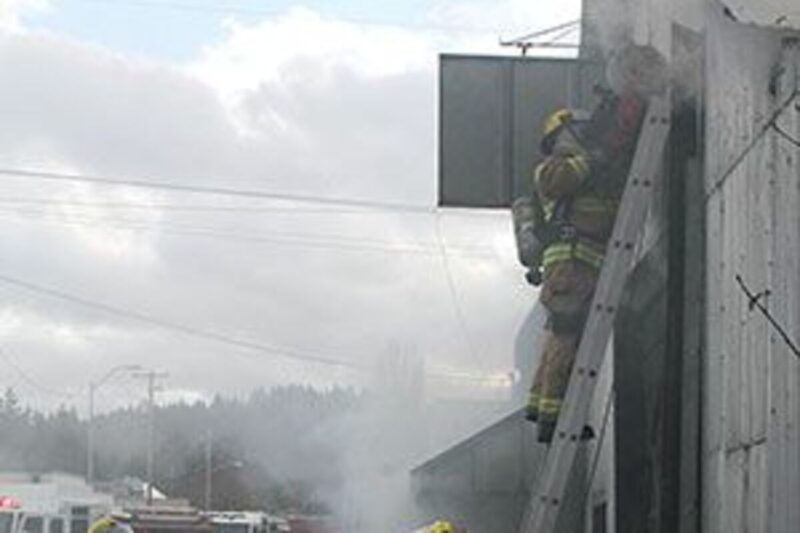Sean C. Morgan
Fire destroyed a former downtown business structure Saturday afternoon.
Firefighters responded to 1324 13th Ave., General Heating and Sheet Metal, at 1:30 p.m. to find the structure fully involved.
The property included four units, an apartment in the back of the General Heating and Sheet Metal building, a metal shop area to the north and a small house in the back, to the west.
The house was not damaged, and owner Russell Barley said that the shop area mostly escaped fire damage, although items in the shop were wet.
“They did a good job of stopping it,” said Fire Chief Dave Barringer. Firefighters were there for a while mopping up hot spots.
Firefighters responded with three engines. The fire caused about $30,000 in damage to the property and $40,000 to contents.
Fire investigators were unable to determine a cause, Barringer said. There were no outlets in use. Fluorescent lighting was in use, and lights fell as the interior collapsed. It was unclear whether the lights could have started the fire.
It was difficult to locate an ignition source with the materials stored inside the building, including cabinets, boxes, aerosol cans, propane cylinders and welding cylinders, Barringer said, although witness reports put it within a few feet, about 8 feet, of the front wall and windows.
Police investigated a rumor that someone had threatened to burn the building down, Barringer said, but the officer learned that the information was third- or fourth-hand. All of the doors were bolted and locked, and firefighters had to breach them to enter the structure.
The Sweet Home Fire and Ambulance District terminated command of the fire at 5:44 p.m.
“It used to be a blacksmith shop,” Barley said. Then it was turned into a vehicle repair shop and gas station.
H.G. Smith, Barley believes was the name, operated the repair shop, and he constructed the metal building in 1951.
Don Menear had it for years afterward, and then Bob Donnell bought it and operated a large heating and air conditioning business, one of the largest gas conversion business in the state, Barley said. He had three to four crews working from the location.
Later Donnell owned and operated Sweet Home Ammunition Company there, Barley said. “It was a big going concern – had 16 employees in there.”
Later, a computer company opened up in the building, and then it went into foreclosure, Barley said. Barley bought it in 2007. He slowly moved things in while Donnell slowly moved things out.
Barley stored a variety of items inside the buildings, he said. All of his life, he has been fascinated by machines and he enjoys creating “kinetic art” and “iron art,” from old machine parts.
In September, he parked a 1961Austin-Healey Sprite, known as the Bugeye and cousin to the MG Midget, inside the shop. He has been looking forward to putting a motor in it and getting it running. His collection includes pedal cars, antiques and collectibles.
“There were things mainly in the machine shop that I don’t think were destroyed,” Barley said.
The office area, which was destroyed, had a baby cart, original oil paintings and other collectibles, which were destroyed in the fire.
“I’ve just been using it for storage,” Barley said. “It’s just a real blow to me.”
After dealing with health issues, “I was looking forward to getting some muscle back and working over there on projects,” Barley said.
The building wasn’t insured, he said. He couldn’t insure because of the construction techniques used on the house behind the shop and office.
The house is rented, Barley said, but the studio apartment inside the General Heating building was mainly used by family members on a temporary basis. His ex-wife had been using it prior to the fire.
He doesn’t know yet what he’s going to do with the house, Barley said. He is buying it on a land-sales contract, and he needs to confer with the registered owner of the property. Until then the fate of the buildings is in limbo.
Barley received help following the fire from Lorin Paul of Timberline Cabinetry, he said, when he obtained wood and boarded up the old building.
“He was a lifesaver,” Barley said.





